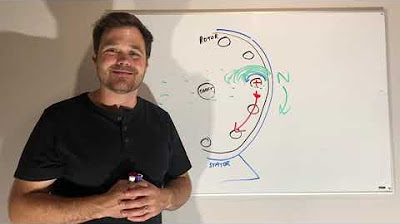Drehmoment berechnen + Erklärung des Hebelgesetz - einfach erklärt mit Beispielen
Summary
TLDRThis educational video introduces the concept of torque, essential for understanding mechanics. It begins with a brief overview of the lever principle, attributed to Archimedes, emphasizing how the force exerted at a pivot point relates to lever length. The video clarifies the difference between torque and mechanical work, both measured in newton-meters, but used in different contexts. It explains the formula for calculating torque and illustrates its application through a practical example involving a crane. The video highlights the importance of directionality in torque and concludes with encouragement to explore further engineering concepts on their platform.
Takeaways
- 😀 Understanding torque is essential in engineering, particularly when applying the principles of levers.
- ⚖️ The lever principle, based on Archimedes, states that force exerted at a distance from a pivot increases torque.
- 📏 Torque (M) is calculated using the formula M = F × r, where F is the force in Newtons and r is the distance in meters.
- ⚠️ Torque should not be confused with mechanical work, even though both are measured in Newton-meters.
- 🔄 Positive torque indicates counterclockwise rotation, while negative torque indicates clockwise rotation.
- ✋ The right-hand rule helps determine the direction of torque: thumb points to the pivot, index finger to the force, and middle finger indicates torque direction.
- 🛠️ Multiple torques can act on a body; for equilibrium, the sum of all torques must equal zero.
- 📊 In a practical example, a crane's load, its weight, and a counterweight are analyzed to calculate total torque.
- 🔍 Understanding the signs of torque (positive or negative) is crucial for accurate calculations.
- 🎓 For further learning, free engineering videos are available at Study Flex.
Q & A
What is the primary focus of the video?
-The video explains the formulas needed to understand torque and how to apply them using a concrete example.
What fundamental concept related to levers is discussed in the video?
-The video discusses Archimedes' law of the lever, which states that the force exerted at a pivot point is proportional to the length of the lever.
How is torque defined in the context of levers?
-Torque is defined as the measure of how much a force acting on an object causes that object to rotate around a pivot point.
What is the formula for calculating torque?
-The formula for torque (M) is M = F * r, where F is the force in newtons and r is the length of the lever arm in meters.
What units are used to measure torque?
-Torque is measured in newton-meters (Nm).
How can one distinguish between torque and mechanical work?
-Although both torque and mechanical work are measured in newton-meters, torque involves forces and distances that are perpendicular to each other, while work involves forces and distances that are parallel.
What is required for a lever to be in equilibrium?
-For a lever to be in equilibrium, the sum of all torques acting on it must equal zero, meaning the clockwise and counterclockwise torques must balance each other.
How can the direction of torque be determined?
-The direction of torque can be determined using the right-hand rule, where the thumb points in the direction of the force application, and the fingers show the direction of the torque.
What example is used in the video to illustrate the calculation of torque?
-The video uses the example of a crane with a load of 10 kN, its own weight of 13 kN, and a counterweight of 16 kN to illustrate the calculation of torque.
What result did the example calculation yield for the torque?
-The example calculation resulted in a torque of -33 kNm, indicating a negative value.
Outlines

Esta sección está disponible solo para usuarios con suscripción. Por favor, mejora tu plan para acceder a esta parte.
Mejorar ahoraMindmap

Esta sección está disponible solo para usuarios con suscripción. Por favor, mejora tu plan para acceder a esta parte.
Mejorar ahoraKeywords

Esta sección está disponible solo para usuarios con suscripción. Por favor, mejora tu plan para acceder a esta parte.
Mejorar ahoraHighlights

Esta sección está disponible solo para usuarios con suscripción. Por favor, mejora tu plan para acceder a esta parte.
Mejorar ahoraTranscripts

Esta sección está disponible solo para usuarios con suscripción. Por favor, mejora tu plan para acceder a esta parte.
Mejorar ahoraVer Más Videos Relacionados

Torque, Basic Introduction, Lever Arm, Moment of Force, Simple Machines & Mechanical Advantage

How a Quadcopter Works - Flight Mechanics, Components, & Sensors (2)

How a motor rotor generates torque with magnetic fields

Torque Converter, How does it work?

FISIKA KELAS XI || Momen Gaya dan Momen Inersia || DINAMIKA ROTASI DAN KESETIMBANGAN BENDA TEGAR

TORQUE OU MOMENTO DE UMA FORÇA | RESUMO DE FÍSICA PARA O ENCCEJA
5.0 / 5 (0 votes)
